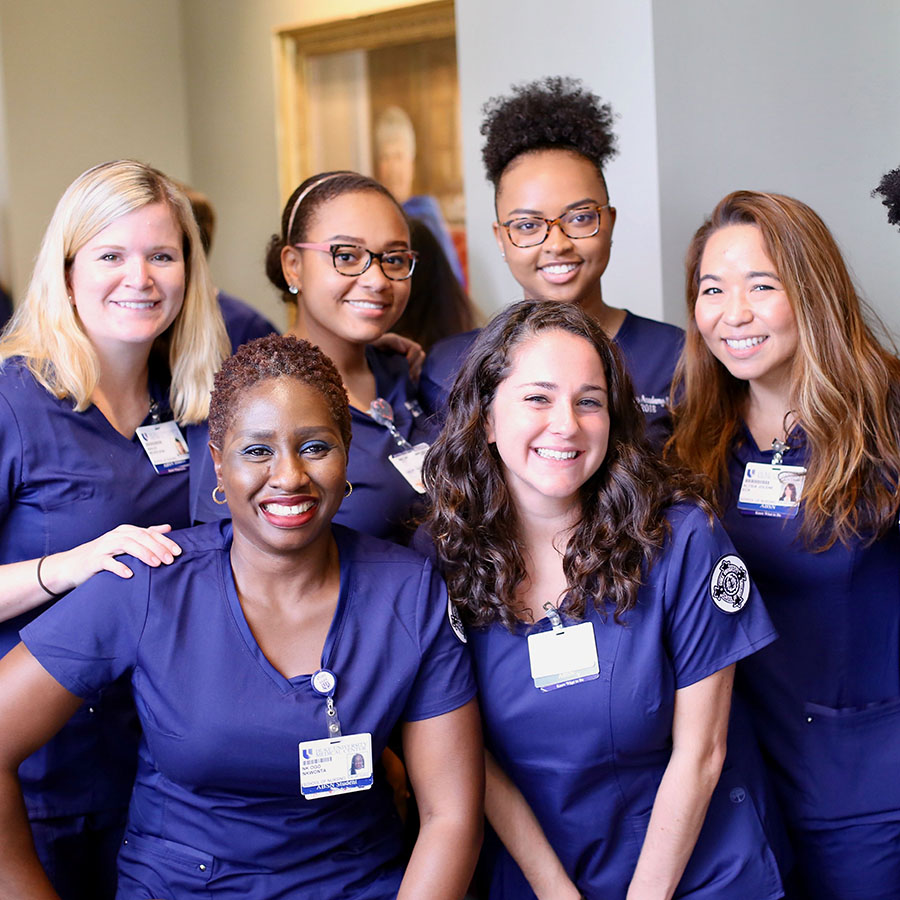Empowering Future Nursing Leaders: Celebrating Women’s History Month

It comes as no surprise that more than 90 percent of nurses in health care are women. As we celebrate Women’s History Month, we would like to recognize and celebrate the contributions past and current faculty and staff have made to the nursing profession and to the continuous growth of our school, empowering our students to become transformational nursing leaders.
In 1931, DUSON welcomed the first class of 24 undergraduate students under the direction of two truly inspirational women, Dean Bessie Baker and instructor Ann Henshaw Gardiner. Dean Bessie Baker served as dean of the School from 1931-1938 and is now the namesake of Baker House, a part of the Duke University Hospital complex and home to Duke’s Department of Obstetrics and Gynecology. Ann Henshaw Gardiner taught nearly all of the courses in the School’s early years and supervised the implementation of the evolving curriculum during the School’s first decade.
The School has come a long way in its journey of educating the future leaders in the nursing. In 1958, the School was one of the first in the nation to offer a graduate nursing program and in 1984, the last class of BSN students graduated. Facing a nursing shortage in the late 1990s and early 200s, the School created its accelerated BSN degree to meet the need of more nurses nationwide. In 2006, the School accepted the first students into the new PhD program and in 2008 launched the first Doctor of Nursing Practice program in North Carolina.
Moving into the present, we highlight how some of our faculty mentor and guide students, coaching them to be confident in their abilities and leaders in their roles.
AnnMarie Walton, PhD, RN, MPH, OCN, CHES, assistant professor, teaches in the School’s MSN program. Walton empowers her students by reminding them about their personal calls to nursing. “I always try to remind my students that their heart is what's needed for nursing. That’s not something that can be lost nor a skill to be evaluated,” says Walton. Once students believe that they are nurses at their core, she can help them see that the skills and training they’ve learned are valuable.
Diane Uzarski, chief of staff, is an instructor in the DNP Executive Leadership program. She transforms education by sharing her knowledge and experiences with the next generation of nurse leaders, by reminding them of their strengths and challenging them to reach new heights in their careers. “I like to tell my students and mentees to have patience and be a sponge,” says Uzarski. “I want them to realize that it’s beneficial to take their time and learn from those people they admire.”
Students who receive a distance-based education can sometimes feel disconnected from faculty and their fellow students at DUSON. Kathy Trotter, DNP, CNM, FNP-C, FAANP, FAAN, associate professor and lead faculty for the Women’s Health program ensures that students coming to campus have the support they need to feel welcome and confident on campus. “When students come to campus, we like to make sure they’re walking into a welcoming environment,” says Trotter. “We create an environment that supports our students through listservs, Facebook groups and event cohort outings while they are on campus, giving them real opportunities to get to know others.”
Jacquelyn McMillian-Bohler, PhD, assistant professor and instructor in the ABSN program, originally wanted to pursue a career in broadcasting—serving as a health care correspondent—but later had a change of heart and chose to pursue nursing specializing in women’s health. “I really like to give my students the right tools to practice and promote health coaching,” says McMillian-Bohler. “It’s important our students gain the skills to help their patients achieve the wellness that looks and feels right to them.” Her best advice to students is to recognize that nursing is difficult but that there are always good days, and those days and experiences are so meaningful.
Midge Bowers, DNP, RN, FNP-BC, CHFN, CHSE, A.A.C.C., FAANP, associate professor and lead faculty for the cardiology program recognizes that students in her program are unique and tries to tailor experiences for individuals when she can. “I ensure that my students have the right experiences in the program to allow them to grow not only as skilled nurses, but to also gain the skills to be effective critical thinkers and to grow as leaders,” says Bowers. She adds that she encourages students to never stop learning and to allows challenge themselves.
Stephanie DeVane-Johnson, PhD, CNM, assistant professor and instructor in the ABSN program says that she aims to inspire the next generation of nurses by being kind, approachable and acting as a safe haven for any student in need. “It costs nothing to be kind,” says Johnson. “I want to empower students to use their skills to be kind to one another and always be able to help when needed.”
Duke University School of Nursing is proud of its history, past and present, of embracing inclusion and strengthening our students, communities, and the nursing profession.
Join us as we celebrate Women’s History month and celebrate female nurses everywhere.